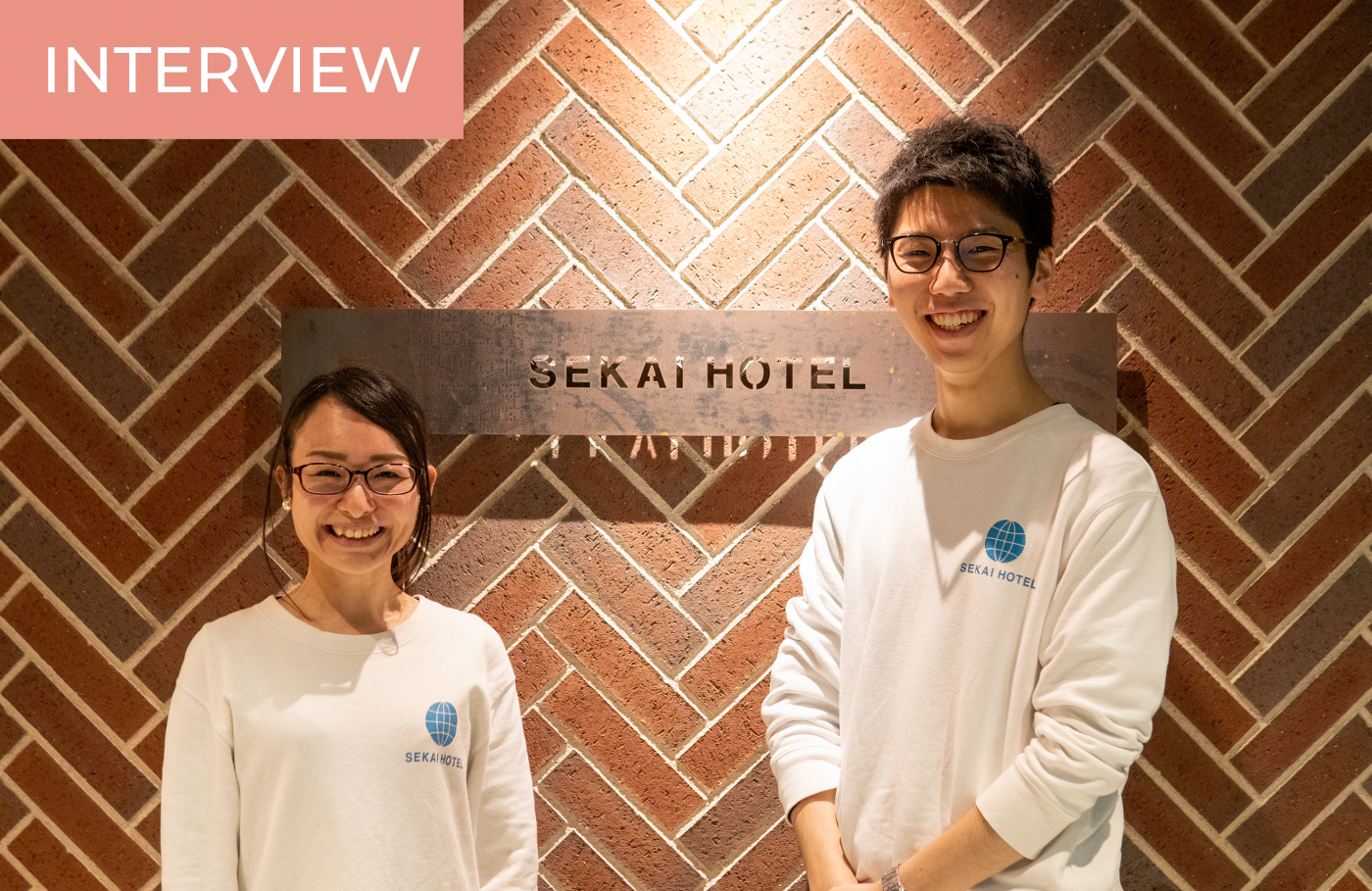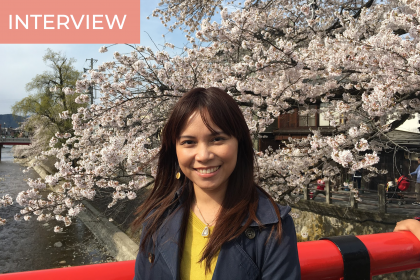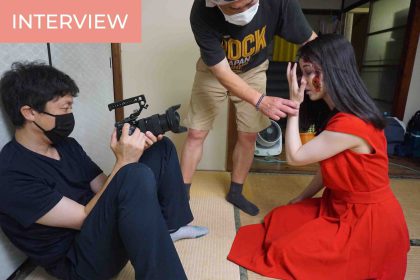Before starting to work at SEKAI HOTEL in September 2019, Yuki had many experiences in the accommodation and social venture industries. She used to work for Hoshino Resorts, Japan’s most famous ryokan [traditional inns] and luxury hotels group. There, Yuki worked on how to give life back to ryokan that were in deficit. Later, she left Japan to work in an educational start-up in the Philippines. Finally, after returning to Japan, she worked in a consulting company, which in turn led her to discover SEKAI HOTEL. In this interview, she tells us how it is possible to conciliate working for an accommodation business, create social good, and what the latter means for her.
Could you explain to our readers what your job at SEKAI HOTEL consists of?
I’m the director of public relations and business development at SEKAI HOTEL in Osaka. The concept of SEKAI HOTEL is called “whole town hotel” meaning that it’s the whole town that becomes a hotel.
We are located in the eastern part of Osaka, more precisely in Fuse district’s shotengai [shopping streets]. We have renovated vacant stores and unoccupied houses, and turned them into our reception and hotel rooms. Fuse is a place that’s famous for its factories, so we have included this aspect in the design of our rooms. Items such as chairs and lamps were made by the local factories, too.
After our guests’ check-in at the reception, we go out in the shopping streets and lead them to their room in one of the other buildings. In the usual Japanese hotels, you will often find a breakfast lounge and a large public bath. At SEKAI HOTEL, these services are provided by a café and the local bathhouse. When they do the check-in, our guests receive a “SEKAI PASS” that allows them to use some services for free and get discounts at local partner shops. Our objective is to encourage guests to experience everyday life in the area and interact with the people. We understand that what seems ordinary life to us can feel very special to foreign visitors.
This way, we also support the local economy. For example, the café that offers breakfast was about to close permanently when we became partners. Now it’s used not only by the locals but also by Japanese and foreign visitors. It’s allowed the owner to give her business a fresh start, and she’s been studying English to better communicate with her international customers. We’re happy to see that in their feedback, our customers appreciate the fact that we support the small business owners of our community.
In Japan, hotels insist on the importance of “hospitality” and “omotenashi.” But at SEKAI HOTEL, we prefer to talk about “friendship.” Instead of the usual hierarchical relationship where the customer is king, we prefer a friendly horizontal relationship in which we can help each other. We have the same eye level with our business partners in the area.
We also have a project called “Social Good 200.” For each night spent in our hotel by a customer, 200 yen is used for the community and its children, by organizing events, for example. This allows us to create robust and visible bonds with them.
Because of the recent COVID-19 pandemic, we have started some activities online, such as paying for experiences in our local partner shops in advance or making online versions of events for children. We also organize online seminars to reflect on our business from an academic point of view. We’ve invited a cultural anthropology professor to talk about what new merits a company like ours can bring to society.
What has motivated you to work in such a peculiar hotel?
I was very attracted by the social aspect of this work, the fact that the company was not only interested in profit but also in what they could do socially. Since I was a student, I’ve always been interested in social ventures. Social entrepreneurship was something we often talked about at the time.
My previous job was in consulting for such social ventures. That’s where I heard about SEKAI HOTEL for the first time, from a colleague. We decided to have a stay at the hotel, and our experience was full of excitement! We had so much fun using the “SEKAI PASS” to explore the streets and meet the local people. It was like an adventure. As a result, I got fond of how clearly this process sustains the local community.
Another thing that struck me during this experience was the smiles of the people working here. Such an expression was not something you could fake. I grew curious about the company’s working atmosphere and how CEO Mr. Yano was developing his organization. I decided to work here because I was attracted both by the organization in itself and by what it was doing.
Is there a specific message you would personally like to convey to people through your work?
I hope that by experiencing the ordinary everyday life here, our guests can reflect on their own daily life and bonds with their community back home. I also think that meeting people is at the center of the experience. For example, when I traveled in India, I received a considerable culture shock. It was the first time I experienced an everyday life in which religion was at the base of everything. I talked a lot with Indian people. I looked back at what I considered ordinary from a different perspective. I realized that religion was completely absent from my normal life at home. I hope our customers can have experiences like mine.
I also hope it will create a positive impulse and influence for the local community. When visitors tell them that this place is nice and exciting, or that the local food is delicious, the people’s point of view about their own town improves.
I am originally from Saitama Prefecture, and I make new discoveries each time I walk the shopping streets of Osaka. I especially like to make a connection between the surroundings and their history. I often want to know how things have become what they are today. It’s one of the pleasures tourists can enjoy. I’d really like to include the context of things in the tourism business.
What are your projects or objectives for the future?
First, I’d like to expand our relationships with local business partners. SEKAI HOTEL is an accommodation business, but it’s also a lot about community development. When more people come to Fuse, and more people know about its qualities, there are good consequences for the local businesses. When I talk to the business owners, they all have the same objective: making their town a better place. Now we’re trying to unite everybody as a “team” despite the differences in business types. Tourism is an excellent way to make people come together.
Secondly, I’m working on social impact investment. I am researching what values we can create for our society, other than monetary value. This could be by improving the education of local children or making civil rights progress. Many businesses already do this in other countries, but this is still new in Japan. It would be great if we could create a precedent.
Is there anything specific to the Japanese soul/culture/mind that you admire or you have adopted in your work or activity?
In Japan, we have a concept called “sanpo yoshi” [“three-way satisfaction”]. Our CEO often talks about it too. It’s an idea that successful Japanese merchants of the past were tending to. It’s also thought to be one of the reasons why Japan has so many companies that are more than 300 years old. The concept is summed up this way: “Good for the seller. Good for the buyer. Good for society.” I think that nowadays we’re losing sight of the “good for society” aspect of business. In Japan, we say that “the customer is god,” so we’re cautious about their needs. We’re also careful about making a profit. But we’ve started to forget about the society or the environment. I guess that’s why, in reaction, sustainable development goals are becoming such a thing in Japan recently.
I also think that the animist aspect of Japanese culture also influences us at some point. We believe that there is a kami [spirit] in everything, so we take good care of every small thing. The Japanese people are also very sensitive to tiny changes, and I guess that’s why we’re so attentive to the change of seasons and nature. On top of the usual spring, summer, autumn, and winter, we have 72 micro seasons. We have this tendency to try to find beauty and create new values from small details. I’d like to rely on this spirit as an inspiration for our company.
To be honest, my business culture is limited, and I had never heard of “sanpo yoshi” before doing this interview. Looking more in-depth into the history of the Omi merchants behind this concept, I learned that they used part of their profits to build bridges or schools. Using your business to make the world a better place is not a new concept. However, as Yuki says, most companies in our modern societies seem to have lost sight of this aspect. It is very inspiring to see that the young people behind SEKAI HOTEL are thriving on creating new values for their local communities. It is also making me wonder about what I could do on a personal level.
SEKAI HOTEL is an embodiment of the “sanpo yoshi” concept. I hope its team and the people of Fuse can create a precedent, so this expression becomes fashionable again among business ventures in Japan and beyond.







